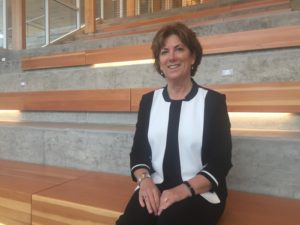Camosun College president Sherri Bell was appointed BC Colleges board chair on November 21, 2019. BC Colleges is a Victoria-based organization that represents 10 BC colleges; presidents from each institution meet regularly to go over common priorities and issues. Those presidents make up the BC Colleges board.
“The role, basically, is that we work really closely with businesses, and government, and key stakeholders,” says Bell. “We provide kind of a unified look at public, post-secondary colleges. The BC Colleges group also works with the teaching universities, institutes, and research universities, because they have their own organizations as well.”
Bell says that the BC Colleges board tries to meet a couple of times every month to collaborate.

“We talk about all kinds of topics,” says Bell. “Sometimes we’ll share best practices, or what our college is working on, so other people can learn from it. Sometimes we’ll have guest speakers from industry or the government come in to speak to the group of presidents, and we will look at common topics, things that we are all working on.”
Bell says that the topics at these meetings vary but the themes are consistent with current issues.
“Some of these examples, for instance, could be Indigenization, or co-op, or work-integrated learning,” says Bell. “I think we always have to be looking at the alignment with the ministry. One of the priorities of government is Indigenization, or looking at ensuring truth and reconciliation takes place.”
Bell says that Camosun has been working on Indigenization since the final report of the Truth and Reconciliation Commission of Canada came out, and that work is an example of something the BC Colleges board discussed.
“Last year all of the presidents got together for a half day and shared what we were doing,” she says. “So that is an example of colleges working together, sharing their experiences as a way to work with each other.”
Work-integrated learning is another area that Bell and the board have been collaborating on.
“Work-integrated learning is making sure that students have opportunities to be placed in either internships or co-ops so that as part of their learning they’ll get to work in a field that they’re interested in,” she says.
Bell believes that “being nimble” is one of the most important things for a college to strive for.
“One of the advantages that colleges have over universities is that we can react very quickly to the needs of the community,” she says. “For example, right now there is a really high demand for health-care assistants. So, what we are able to do is provide—if we have the funding—these courses on Salt Spring Island; we can provide in Indigenous communities; we can provide on the West Shore. So, we can react pretty quickly. We can take current programs and be very quick to respond to industry and government needs.”
Bell says that although the college tries to have a quick-to-respond approach, the results are still not simple.
“Our process to have curriculum approved is a rigorous process, but it doesn’t take years to do,” she says. “Colleges are able to shift gears when we need to, just because of the nature of what we do.”
Bell says that, above all, the most important job she does is being president of Camosun, but being out there working provincially with BC Colleges really helps.
“It’s not an onerous task. I get to be involved in meetings, as well as different projects with BC Colleges. I am always learning, and bringing ideas back to the college, as well as sharing some of the amazing things that we do here. I may have a lot to do,” she says with a laugh, “but I really love it.”
